EDUCATION MATTERS
The jury is out on whether UCT’s online high school will democratise learning
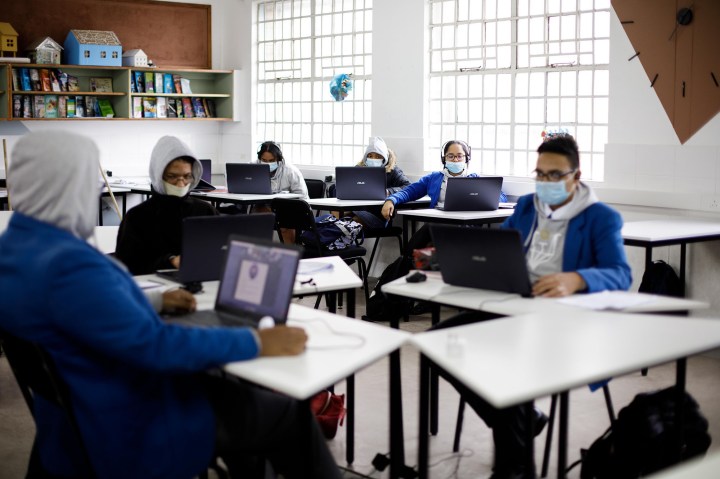
With the tagline ‘learning liberated’, UCT’s online high school will open in 2022. It promises to be a game-changer for basic education in South Africa and the rest of the continent. But there are reservations that the barrier to ICT access means the revolutionary learning model excludes the poor.
“UCT must be commended for thinking outside the box with this courageous initiative. But let’s not pretend this online school levels the playing fields when it comes to educational inequality. It might make it worse.”
This was the punchline of a critical op-ed written by Professor Jonathan Jansen on the University of Cape Town’s (UCT’s) new online high school being launched in partnership with the Valenture Institute in January 2022.
With its private school status, annual fees of R25,140 and internet-reliance, Jansen, who has consistently argued against online learning during the pandemic, pegged the venture as serving the middle class rather than the poor.
But UCT Vice-Chancellor Mamokgethi Phakeng says the high school will “level the playing field with an innovative education model”.
UCT has flown its flag high as the first university on the African continent to enter the secondary school market, with an institution that promises to be the most affordable private school in the country and disrupt the basic education sector.
Other, cheaper online school options exist, such as Think Digital Academy at more than R15,000 a year for matric subjects with tutoring, and Talitha Online Academy, which is roughly R18,000 a year.
Despite opening applications on 21 July, the UCT online high school seems to still be in the planning phase.
Valenture Institute CEO Robert Paddock said close to 1,700 applications were received within the first six days of the launch.
A Curriculum and Assessment Policy Statement (CAPS)-aligned curriculum will be offered to grades 8 to 11 (matrics will start classes in 2023) and an online learning model based on six core pillars:
- Personalised pacing;
- Mastery-based progression through learning modules;
- Caring teachers and support coaches;
- Supported self-discipline;
- Science of online learning; and
- Data-driven support.
Paddock says personal pacing, coupled with mastery-based progression, will disrupt the current education model by allowing students to engage with learning material at a speed that works for them.
“We can afford to give our learners the opportunity to actually master concepts before they unlock their next module. The flip side is [that] learners who are ahead academically can progress faster.”
The school’s “ecosystem” will also offer the CAPS curriculum for free to the public excluding the dedicated teaching and mentorship offered by the school.
In future, the school will provide a series of bridging courses, as well as matric rewrite and alternative university credit programmes.
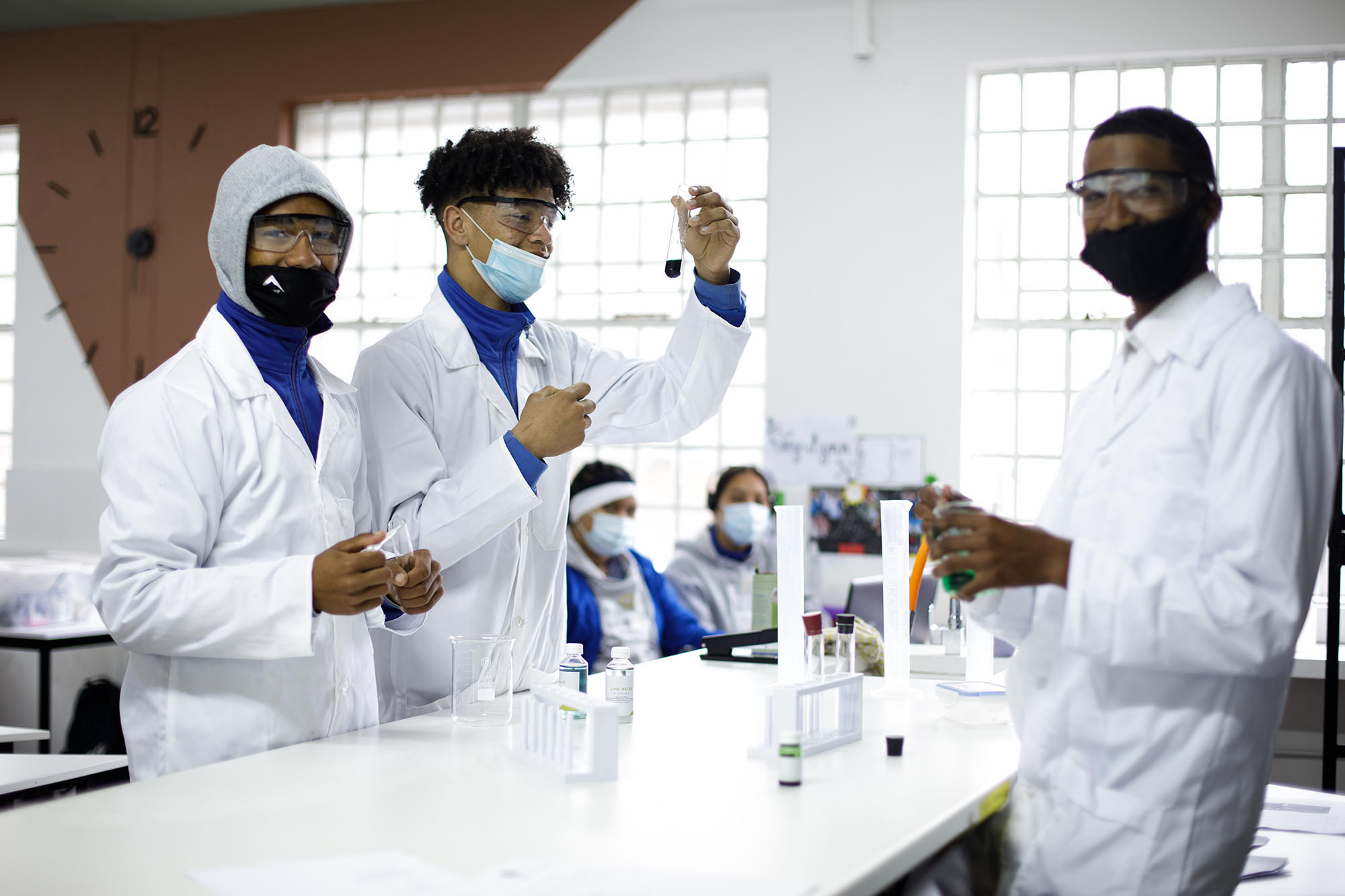
The iBhodi Trust microschool follows a UK-aligned curriculum. Students at the pilot school will revert to the CAPS syllabus once the UCT online school kicks off in January 2022. (Photo: Herman Marx)
Education is in dire straits. Results from the latest Nids-Cram survey show about 500,000 children had dropped out of school during the pandemic, bringing the total number of children aged between seven and 17 not attending school to about 750,000 by May 2021.
Between March 2020 and June 2021, primary school pupils lost out on about 70% of schooling.
Large classroom sizes, crumbling infrastructure, poorly trained teachers and budget constraints are just a few issues that existed pre-pandemic.
“We have to think about more efficient use of our capital expenditure and the way that we deliver quality education at scale. That really is where we believe digital and blended learning has to start playing a role in the ecosystem,” says Paddock.
The ultimate goal is to deliver quality education at scale. But criticisms of online learning are common and, for the most part, valid.
Reliable internet penetration in rural areas is still scarce due to inadequate or poor infrastructure. Though the government has embarked on the ambitious SA Connect initiative, which aims to deliver widespread broadband to the entire country by 2030, the project is lagging behind.
Jansen argues that most children need in-person contact with teachers in school settings and the quiet dedicated learning spaces required to study are largely found in middle-class homes.
School also provides a space for children to escape sometimes harsh home environments and receive meals.
Paddock stresses that an “online only” approach to learning is not effective across the board. To fill this gap, the high school will take on a blended learning approach and set up micro-schools for students who need a physical space to interact with other pupils and mentors.
Microschools are essentially small, private institutions where students are empowered to personalise their education and are held accountable for their own progress.
The model has already kicked off and gained traction overseas with the onset of the pandemic.
It is being tested through a pilot programme at Beacon Hill Secondary School in Mitchells Plain. The microschool was opened in February 2021 by Valenture Institute’s social impact arm, the iBhodi Trust, in collaboration with Beacon Hill and the Western Cape Education Department.
Located in a repurposed storeroom on the Beacon Hill grounds, the microschool services 24 students who were selected through an entrance exam during their grade nine year. The programme follows the Pearson EdExcel curriculum, which is a UK-aligned curriculum.
Unlike a traditional classroom where students engage in-person with a teacher and a blackboard, each pupil is given a laptop, headset, internet access and stationery. Tuition and equipment are technically free, though students still pay annual fees to Beacon Hill.
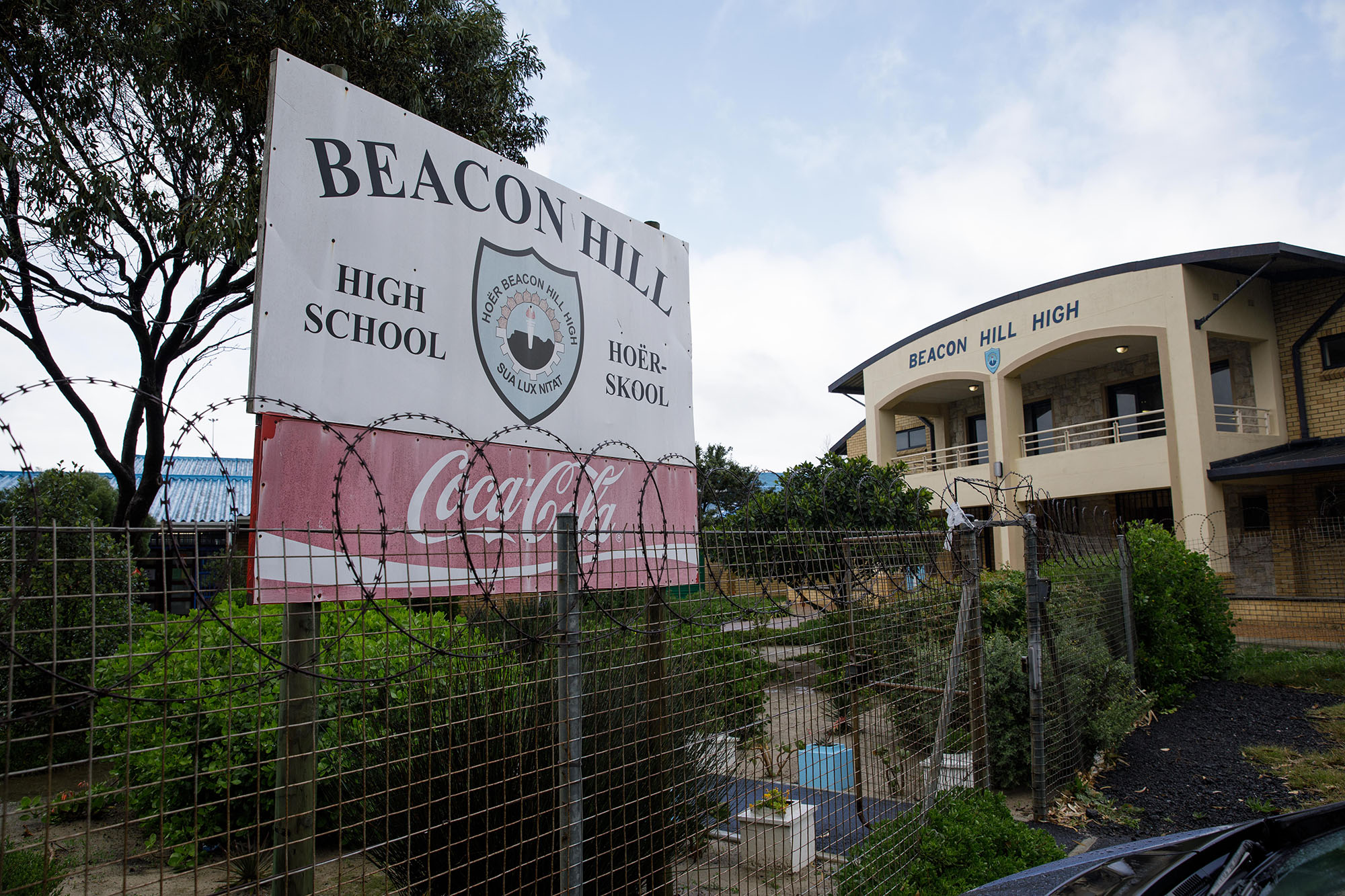
The pilot microschool at Beacon Hill High School in Mitchells Plain has been running since February 2020. (Photo: Herman Marx)
Thomas Wrigley, the iBhodi Trust project lead at Valenture, explains that learning is accessed through the St Stithians Online High School platform. St Stithians College partnered with Valenture Institute to launch its own online institution.
Teachers interact with students via Zoom live sessions, small-group office hours (extra lessons), as well as through discussion forums on the online learning platform.
Pastoral care is provided by an onsite mentor who offers counselling sessions and the like.
One of the aims, Paddock explains, is to link students with “good teachers” despite their geographical location. “This is one of the things that online so elegantly solves.”
Jansen was wary that the project is unsustainable as top-notch teachers need to be paid attractive salaries and private sector partners might be invested in the short-term but lose interest long-term.
Valenture is currently on a recruitment drive to get many teachers on board by September. This will determine how many students they admit into the school.
For 15-year-old Ryan-Lee Reddy, a typical school day begins at 8am and ends at 3pm. On Mondays, he logs on to the learning platform and plans his schedule for the week, then attends live classes. Between classes, he works on his assignments and quizzes. His average day is spent looking at a laptop but after hours he has access to Beacon Hill’s clubs and sports.
“For me the system is working because you have controllable working hours, it’s based on a schedule and you end off on Friday,” says Reddy.
Regarding extracurriculars, concerns are that the online medium will diminish the enrichment offered by face-to-face cultural and recreational activities like contact sports.
The school will offer virtual clubs such as music, book club, mindfulness and debating. Sports activities are external to the school through existing sports clubs and organisations at the pupil’s own cost.
Students work on a modular basis, says Wrigley. “So every week is a specific module [English, maths etc]. Within each there are a certain number of components such as quizzes, assignments, notes and live sessions. In between the live sessions, students are working on their components.”
Students are taught through a “flipped classroom” model where they are expected to engage with learning content before their live classes.
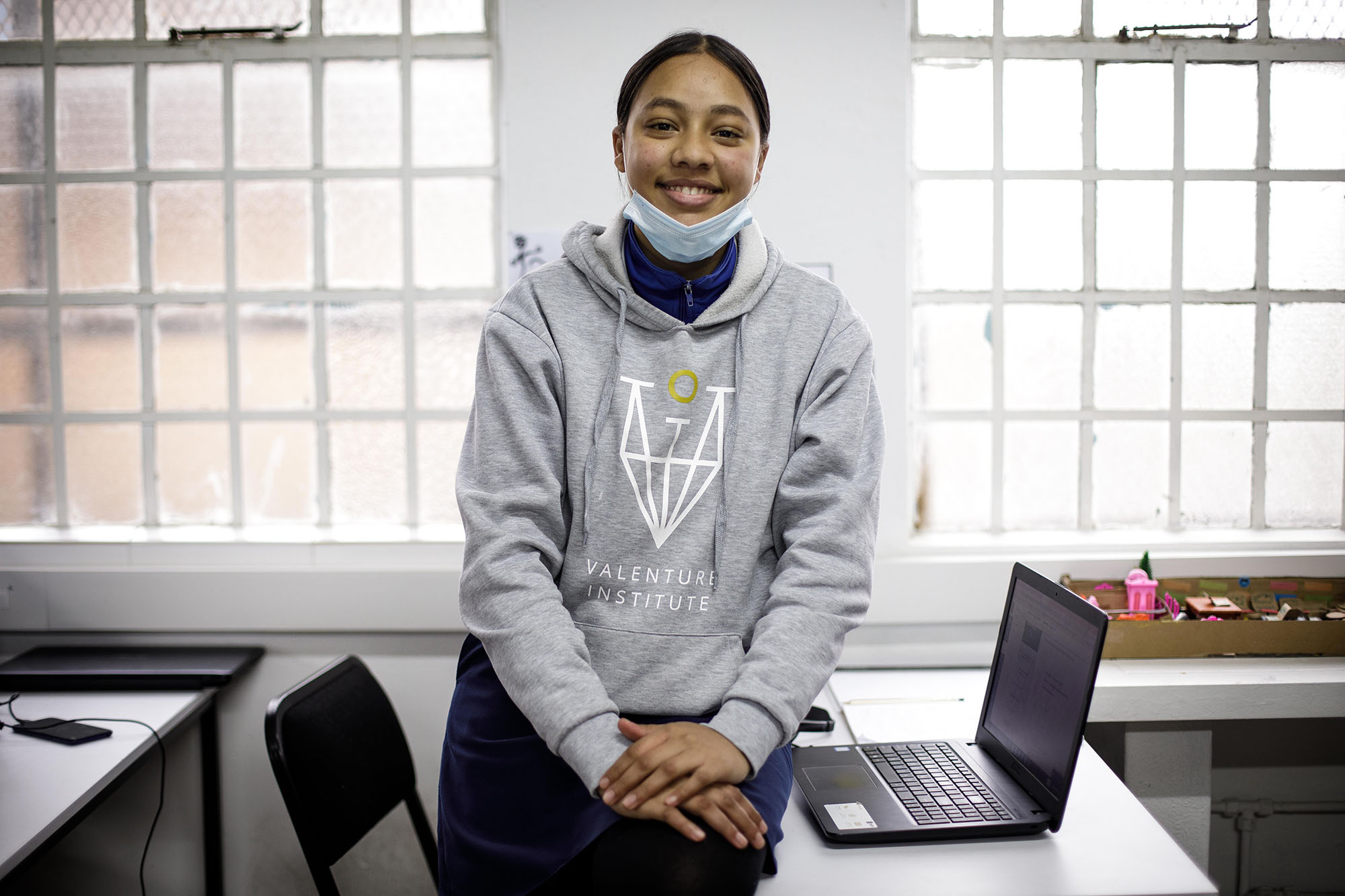
Joy-Lynn Liedemann enrolled at the microschool for an opportunity to study science. (Photo: Herman Marx)
Joy-Lynn Liedemann, also 15, says the method helped her feel more prepared. “You don’t feel as lost when you get into a lesson.”
For practical elements such as science experiments, each student is given a kit with beakers, syringes and other equipment.
Wrigley says students at the UCT online high school will each receive a similar kit to conduct experiments at home but to mitigate the limitations of this, UCT will rely on Fourth Industrial Revolution elements like simulations.
“There are definitely some advantages and disadvantages to that.”
A webcam affixed to a television at the front of the classroom allows teachers to virtually supervise science practicals.
The micro-school at Beacon Hill will serve as the first physical site for the UCT online high school. Discussions are underway to open another micro-school near Imizamo Yethu, in Hout Bay. Students will revert to the CAPS curriculum in 2022.
By repurposing existing infrastructure like libraries, church halls and other spaces into learning sites, the UCT online high school aims to reduce capital expenditure and increase efficiency. They haven’t committed to an exact number of micro schools as this will depend on funding and which areas have demand.
“We’re trying to figure out how we can offer high quality education without having to spend between R80- and R100-million every time a new school needs to be built,” says Wrigley.
The model is already showing positive results. Paddock says results have jumped in maths, science and English.
Wrigley says the top maths student’s results have jumped from an average of 57% to 89%.
Paddock has a 15-year relationship with UCT, through his previous business, GetSmarter which offers online short courses through top universities.
“One of the things that the UCT leadership and I were engaging with is that if we don’t fix the education issues that are further upstream, it is so much harder to remedy those downstream.”
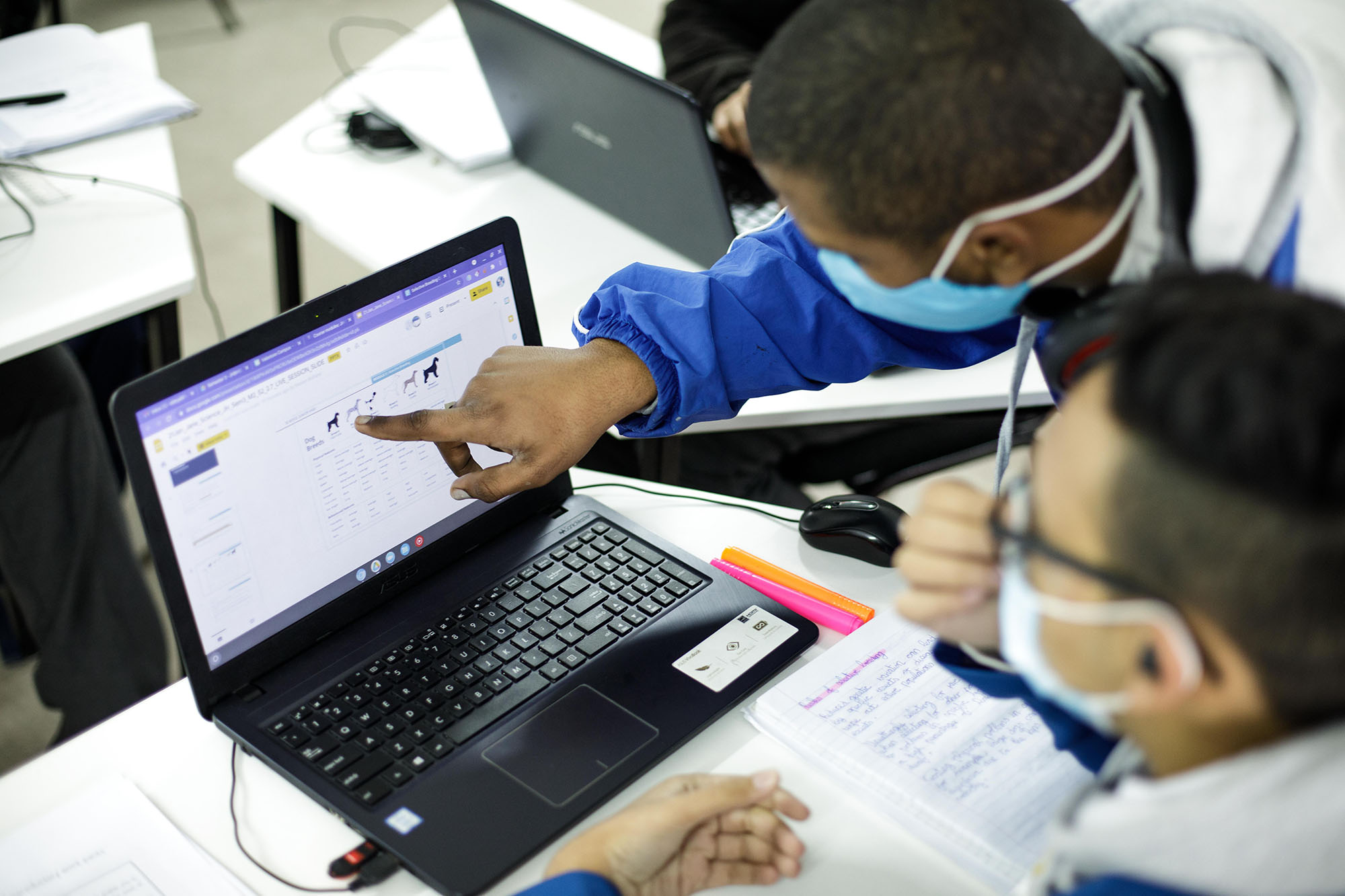
Critics of UCT’s online high school, which is set to launch in January 2022, say it’s for the middle class and not the poor. (Photo: Herman Marx)
Pupils coming from poor schooling systems often struggle in their first year of university, leading to high dropout rates.
In terms of running the school, the Valenture Institute and UCT have a shared governance structure with the vice-chancellor, Valenture’s CEO and an appointed principal sitting on an oversight committee which oversees macro elements of the school.
Below that is an operations and governance committee chaired by the UCT online high school principal and includes registrars from UCT and Valenture Institute as well the dean of the Centre for Higher Education and Development at UCT.
Then there’s the delegated authority, the principal who oversees the high school staff.
Asked whether the UCT staff involved in the school would be overwhelmed trying to fulfill their UCT roles while running a school, Paddock said Valenture Institute would take responsibility for the day-to-day operations of the school while UCT plays an oversight role.
The Centre for Higher Education and Development at UCT was approached for comment but did not respond.
UCT has faced some criticism over the years for its slow administrative processes which may affect the school’s efficiency.
Though the Department of Basic Education is “yet to see” how the school will work, spokesperson Elijah Mhlanga said the department has developed a framework for online schools which has not yet been publicised.
“Once finalised and shared in public, we will be in a better position to see how online schools will impact the sector.” DM




















In 2010 I was fortunate to recieve a grant from ISASA to visit the USA and investigate online schools. My favourite interview was with a group of online microschoolers. We met at Starbucks in LA and the telling comment was: “It’s still school.” What I learned is that there are two parallel changes happening in education. The first is e-learning which is the use of Learning Management Systems, Flipped Classroom practices, Computer guided and accessed mastery learning etc. This can and should be happening in a regular face-to-face classroom as it does revolutionise teaching. The second innovation is online education. I have taught for 35 years and the most change occurred in the last 5 due to these innovations. UCT is new to the field as Curro, Brainline, Bridge House College, Oakhill College, etc all offer online and e-learning opportunities. Anything that can help a child reach their potential is commendable. I see education as a buffet of offerings and the more workable options the better.